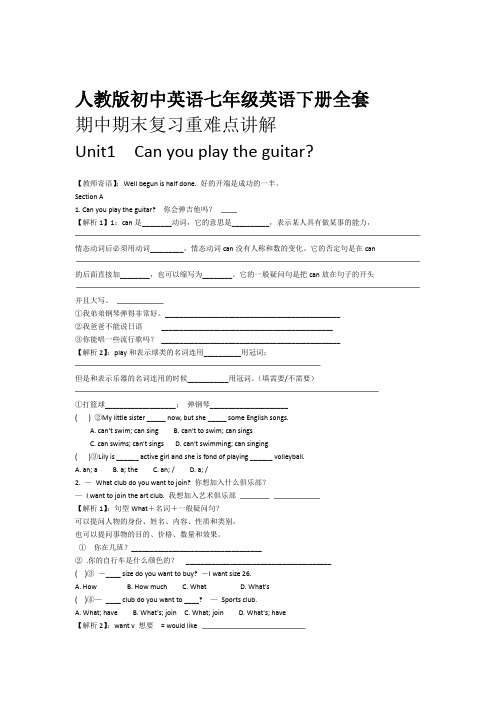2017年人教版初中英语七年级英语下册全套期中期末知识点归纳总结复习【推荐】
- 格式:doc
- 大小:67.50 KB
- 文档页数:29

七年级下册英语期中考复习知识点HEN system office room 【HEN16H-HENS2AHENS8Q8-HENH1688】U1-U6单元期中考试重要复习点Unit 1 Can you play the guitar?1.Can you play the guitar? can+动词原形,它不随主语和数而变化。
Can he play the guitar? Yes, he can./No, he can’t play the guitar.She can speak English very well.2.Play + 球类运动 play + the +乐器 Playbasketball/play the guitar/play chess3.want的用法:想做某事want to do sth I want to join the music club.4.good的短语: be good with sb 善于应付...的;和……相处的好She is good with the old people.be good at 擅长 (1) be good at +sth (2) be good at doing sth(1) I am good at English.(2) He is good at swimming.Be good for 对....有好处 It is good for health.5.Tell 的用法:(1) tell sb sth. (2) tell sb to do sthTell stories 讲故事 story-telling club 故事俱乐部6.Talk 的用法:(1) talk to sb. (2) talk with sb (about sth.)Talk to your parents./ He talks with me about soccer.7. Or 的用法:(1)“或者”,放在否定句中I don’t like pears or bananas.(2) “还是”,放在选择疑问句中 Is he astudent or a teacher?8. Need to do sth. 需要做某事 I need to go to school at six.9.几个短语: make friends with sb 和某人交朋友 on the weekend/on weekends在周末At the old people’s home 在敬老院里 English-speaking students 说英语的学生Unit 2 What time do you usually go to school?1.what time和when引导的特殊疑问句。

人教版英语七年级下册期中知识点归纳一、词汇1.1. 几个常用短语和表达•What’s the matter? 什么事情?•be late for 上课迟到•in front of 在……前面•next to 在……旁边•go straight 直走•turn left 向左转•turn right 向右转1.2. 单词下面是本单元重点单词:1.afraid 害怕的2.angry 生气的3.arrive 到达4.busy 忙碌的5.grade 年级6.important 重要的7.library 图书馆8.relax 放松9.restroom 停车场10.shopping 购物二、语法2.1. 现在进行时现在进行时表示现在正在进行或发生的动作,用来描述当前正在进行的事情。
其结构为“主语+be(am, is, are)+v. -ing”。
举个例子:I am reading a book now.2.2. 一般现在时一般现在时表示现在的动作或状态。
其结构为“主语+v. / does not (doesn’t) + v.”。
当主语为he, she, it时,需在动词后加-s。
举个例子:He often goes to school by bike.2.3. 句型•What are you doing? I am reading a book. 你在干什么?我在看书。
•Where is the restroom? 地下停车场在哪里?•When are you going to Beijing? 你什么时候去北京?三、阅读理解3.1. 阅读短文下面是一篇关于乔治的短文,请仔细阅读。
George is a student. He is in Grade Seven. He is busy every day. He gets up early and goes to school by bike. He has three classes in the morning. Then he has lunch at school. He likes to eat beef and rice for lunch. After lunch, he has two classes in the afternoon. He goes home at five o’clock. He relaxes and watc hes TV in the evening.请根据短文回答以下问题:1.What grade is George in?2.How does he go to school?3.What does he eat for lunch?4.What does he do in the evening?3.2. 阅读短文并填空下面是一篇关于购物的短文,请仔细阅读。

人教版英语七年级下册期中知识点归纳下面是人教版七年级英语下册期中知识点的归纳:1. 一般现在时的用法:- 表示经常性、习惯性的动作或状态。
- 表示客观事实、常识性的真理。
- 表示现在的情况。
- 表示现在的想法、看法或感觉。
2. 祈使句的用法:- 表示请求、命令、建议或提醒。
- 肯定句的主语为“you”,但一般省略。
3. 可数名词与不可数名词的区分与用法。
4. 数词的用法:- 表示数量。
- 表示顺序。
- 表示比较。
5. 数词+名词的用法。
6. 冠词的用法:- 表示特指。
- 表示泛指。
- 表示某一类人或物。
7. 物主代词的用法。
8. 形容词的用法:- 表示人或物的特征。
- 修饰名词。
9. 表示时间的介词:- at:具体点的时间、节日、星期几。
- in:年、季节、月份、上午或下午、未来某一段时间。
- on:具体的某一天。
10. 表示地点的介词:- in:表示大的范围、较大的场所。
- on:表示较小的范围、较小的场所。
- at:表示具体的地点、较小的场所。
11. 复数形式的构成与用法。
12. 主谓一致的用法。
13. 区分实义动词和助动词的用法。
14. 表示否定的方法:not,don’t。
15. 一般过去时的用法:- 表示过去的动作或状态。
- 表示过去的习惯。
16. 特殊疑问句的用法。
17. 表示能力与习惯的情态动词“can”和“could”的用法。
18. 表示愿望、请求和建议的情态动词“would”和“should”的用法。
以上是部分人教版七年级英语下册期中知识点的归纳,希望对你有帮助!。

人教版初一英语下册知识点总结第一篇:人教版初一英语下册知识点总结Unit 1 Where’s your pen pal from?一.短语:.be from = come from来自于----2. live in 居住在---3. on weekends 在周末 4 .write to sb = write a letter to sb 给某人写信;写信给某人.in the world 在世界上6.in China在中国7.pen pal笔友8.14 years old14岁9.favorite subject 最喜欢的科目10.the United States 美国the United Kingdom 英国New York 纽11.speak English 讲英语 like and dislike 爱憎9.go to the movies 去看电影play sports 做运动二.重点句式:Where’s your pen p al from? = Where does your pen pal from/Where does he live?3 What language(s)does he speak?4 I want a pen pal in China.5 I can speak English and a little French.6 Please write and tell me about yourself.7 Can you write to me soon?8 I like going to the movies with my friends and playing sports.三.本单元的国家,人民、语言对应。
Canada----Canadian----English / French2 France------French------FrenchJapan------Japanese----Japanese4 Australia----Australian-----Englishthe United States------American----English6 the United Kingdom---British-----EnghishUnit 2 Where’s the post office?一. Asking ways:(问路)1.Where is(the nearest)……?(最近的)……在哪里?2.3.4.5.Can you tell me the way to ……?你能告诉我去……的路吗?How can I get to ……?我怎样到达……呢?Is there …… near here / in the neighborhood?附近有……吗?Which is the way to ……?哪条是去……的路?二.Showing the ways:(指路)1.Go straight down / along this street.沿着这条街一直走。

Unit 1 Can you play the guitar?1.play chess 下国际象棋play the guitar 弹吉他弹吉他2.speak English 说英语English club 英语俱乐部英语俱乐部3.talk 3.talk to to 跟…说 play play the the the violin violin 拉小提琴小提琴 4.play the piano 弹钢琴弹钢琴弹钢琴 play the drums 敲鼓敲鼓5.make friends 结交朋友结交朋友6.do kung fu 会(中国)功夫会(中国)功夫7.tell stories 讲故事讲故事 play games 做游戏8.on the weekends (在)周末(在)周末(在)周末 用法集萃play play ++棋类/球类下……棋,打……球1.play the +西洋乐器弹西洋乐器弹/拉……乐器乐器2.be good at doing sth.= do well in doing sth.擅长做某事擅长做某事擅长做某事 3.be good with sb. 善于与某人相处善于与某人相处 4.need sb. to do sth. 需要某人做某事需要某人做某事 5.can + 动词原形能/会做某事会做某事 6.a little + 不可数名词一点儿不可数名词一点儿…… 7.join the …club …club 加入…俱乐部俱乐部8..like to do sth. =love to do sth. 喜欢/喜爱做某事喜爱做某事 like ding sth.喜欢做某事喜欢做某事 典句必背Can you draw? Yes, I can. / No, I can’t. 1. What club do you want to join? 2. I want to join the chess club. 3. Y ou can join the English club. Sounds good. 4. 4. I I I can can can speak speak speak English English English and and and I I I can can can also also play soccer. 5. Please call Mrs. Miller at. 重点句子点拨:1、Can you play the guitar?你会弹吉他吗?你会弹吉他吗?点拨1:can 是情态动词,它的意思是能、会,表示某人具有做某事的能力,情态动词后必须用动词原形,态动词后必须用动词原形,情态动词情态动词can 没有人称和数的变化。

人教版初中英语七年级英语下册全套期中期末复习重难点讲解Unit1 Can you play the guitar?【教师寄语】:Well begun is half done. 好的开端是成功的一半。
Section A1. Can you play the guitar?你会弹吉他吗?【解析1】1:can是________动词,它的意思是__________,表示某人具有做某事的能力,情态动词后必须用动词_________,情态动词can没有人称和数的变化。
它的否定句是在can 的后面直接加________,也可以缩写为________。
它的一般疑问句是把can放在句子的开头并且大写。
①我弟弟钢琴弹得非常好。
_______________________________________________②我爸爸不能说日语______________________________________________③你能唱一些流行歌吗?________________________________________________【解析2】:play和表示球类的名词连用__________用冠词;但是和表示乐器的名词连用的时候___________用冠词。
(填需要/不需要)①打篮球___________________;弹钢琴_____________________( ) ②My little sister _____ now, but she _____ some English songs.A. can't swim; can singB. can't to swim; can singsC. can swims; can't singsD. can't swimming; can singing( )③Lily is ______ active girl and she is fond of playing ______ volleyball.A. an; aB. a; theC. an; /D. a; /2. -What club do you want to join? 你想加入什么俱乐部?—I want to join the art club. 我想加入艺术俱乐部【解析1】:句型What+名词+一般疑问句?可以提问人物的身份、姓名、内容、性质和类别,也可以提问事物的目的、价格、数量和效果。
初一下册英语期中考试重点人教版1.初一下册英语期中考试重点人教版篇一语法:现在进行时1)现在在进行时的形式是:助动词be(am,is,are)+动词-ing形式(也叫现在分词),表示现在(说话的瞬间)正在进行或发生的动作。
2)现在进行时的确定句形式主语+be(am,is,are)+动词现在分词+其他I’m watching TV.3)现在进行时的否定句形式主语+be(am,is,are)+not+动词现在分词+其他They are not playing soccer.4)现在进行时的一般疑问句形式及回答Is(am,are)+主语+动词现在分词+其他?Yes,主语+is/am/are.No,主语+isn’t/aren’t/am not.Are you reading?Yes,I am. -No,I am not.5) 现在进行时的特别疑问句形式:特别疑问词+is/am/are+主语+现在分词+其他?What is your brother doing?2.初一下册英语期中考试重点人教版篇二句型与日常交际用语1.-What+be+主语+doing? ….正在做什么?主语+be doing …正在做某事。
2.-Here are/is…Here are some of my photos.Here is a photo of my family.3.-Do you want to go to the movies?Sure.4.-When do you want to go?Let’s go at seven.5.-Where do people play basketball?At school.6.-What’s he waiting for?He’s waiting for a bus.7.-What’s he reading?He’s reading a newspaper.8. You can see my family at home.Can +do(动词原形) 可以…3.初一下册英语期中考试重点人教版篇三【重点句型】1. What can we do for the children in poor areas?我们可以为贫困地区的孩子们做什么?2. They need clothes and shoes most.他们最需要衣服和鞋子。
人教版七年级下册英语期中复习知识点梳理(Unit 1 Can you play the guitar?)1. Can you play the guitar? can+动词原形,它不随主语和数而变化。
Can he play the guitar? Yes, he can./No, he can’t play the guitar.She can speak English very well.2. Play + 球类运动play + the +乐器Play basketball/play the guitar/play chess3.want的用法:想做某事want to do sthI want to join the music club.4.good的短语:be good with sb 善于应付...的;和……相处的好She is good with the old people.be good at 擅长(1) be good at +sth(2) be good at doing sth(1) I am good at English.(2) He is good at swimming.Be good for 对....有好处It is good for health.5. Tell 的用法:(1) tell sb sth.(2) tell sb to do sthTell stories 讲故事story-telling club 故事俱乐部6. Talk 的用法:(1) talk to sb.(2) talk with sb (about sth.)Talk to your parents./ He talks with me about soccer.7. Or 的用法:(1)“或者”,放在否定句中I don’t like pears or bananas. (2) “还是”,放在选择疑问句中Is he a student or a teacher?8. Need to do sth. 需要做某事I need to go to school at six.9.几个短语:make friends with sb 和某人交朋友on the weekend/on weekends在周末At the old people’s home 在敬老院里English-speaking students 说英语的学生。
人教版七年级下册英语期中后知识点总结Unit7 It’s raining!◆短语归纳基础巩固1. at the park 在公园2. no problem 没问题,不客气3.right now 现在4. have a good time/have a great time/have fun/5. take a message捎个口信6. call sb. back 给某人回电话7. on a vacation 在度假拓展延伸1. by the pool 在游泳池边2.drink orange juice 喝橙汁3.study hard 努力学习4. in the mountains 在山里5.some of ......当中的一些6.enjoy oneself 过得愉快◆用法集萃基础巩固1. have a great time/have fun + (in) doing sth. 愉快地做某事2. write to sb. 给某人写信3.be+adj.+to do sth. 做某事是...典型例题I am happy be here.拓展延伸1.tell sb. (not) to do sth. 告诉某人(不要)做某事2.介词+Ving◆典句必背基础巩固1.—How’s the weather? 天气怎么样?—It’s cloudy. / It’s sunny. / It’s raining. 天气多云。
/ 天气晴朗。
/ 天正下雨。
2. How’s it going? 情况怎么样?Great! /Not bad./Terrible! 好极了!/ 不错。
/糟糕!3. Can I take a message for him? 我给他捎个口信好吗?4. I’m having a great time visiting my aunt in Canada.我正在加拿大愉快地拜访我的姑姑。
拓展延伸1. My family and I are on a vacation in the mountains.我和我的家人正在山里度假。
人教版七年级下册英语期末复习知识点总结汇编人教版七年级下册英语期末复知识点总结汇编Unit1 Can you play the guitar?一词形转换1.singv.唱歌singern.歌手singingn.歌唱2.swimv.游泳swimmern.游泳者swimmingn.游泳3.dancev.跳舞XXX.舞者dancingn.跳舞4.drawv.画画drawern.抽屉drawingn.图画5.XXX.说话XXX.发言者XXX发言6.writev.写writern.作家writingn.写作7.XXX.小提琴violinistn.小提琴手8.XXX.钢琴pianistn.钢琴家9.musicn.音乐musiciann.音乐家10.XXX.教XXX.教师二、短语及用法1.play the +西洋乐器play the XXX……play +球类/活动play XXX2.XXX讲英语XXX讲故事talk to/ with sb.和某人交谈 3.be good at + doing XXX擅长做某事=do well in (doing )sthbe good for对……有好处反义:be bad for对……有坏处be good to sb.对……友好= be friendly tobe good with善于应付……的4.make XXX和某人交朋友5.stay at home待在家6.help sb。
with sth/ help sb。
(to )do XXX帮助某人做某事7.on the weekend = on weekends在周末XXX教某人做某事XXX什么俱乐部music XXX XXX10.want to do XXX想要做某事want sb。
to do XXX想要或人做某事11.like to do sth/ doing XXX喜爱做某事12.be free/busy有空/忙碌的13.call sb。
人教版初中英语七年级英语下册全套期中期末知识点归纳总结复习1、如有always ,often, usually, sometimes, seldom, never, oncea....,every...用一般现在时,第一、二人称复数后跟动词原形,第三人称单数后跟动词加's'/'es'。
2、如有now ,look! ,listen, at the moment ....用现在进行时,结构是be (am, is, are) +v-ing3、如有tomorrow, the day after tomorrow, from now on, in +一段时间, some day, next....用一般将来时,结构:will + v原/be going to +v原(没有动词用be )4、如有yesterday, ......ago , last....just now.....用一般过去时动词加‘ed’5. 比较几个“花费”spend :sb. spend some time on sth.某人花费时间做某事sb. spend some time (in) doing sth. 某人花费时间做某事sb. spend some money on sth.某人花费钱买某物sb. spend some money (in) buying sth.某人花费钱买某物Cost:sth . cost sb. some money 某物花去某人钱pay:sb. pay some money for sth. 某人支付钱Take: It takes (took) sb. some time to do sth.做某事花去某人时间6. else常修饰不定代词,关系代词或副词,也可修饰all, much, little等,else要位于其后。
所有格为else's.else修饰不定代词s omething ,everything anything , nothing, somebody, anybody ,nobody和who, what ,when ,where时放后。
(something else)7. the number of…的数目,后跟名词复数,动词用三单,a number of =many,大量,许多后跟名词复数,动词用复数形式。
(a large number of,a small number of )8. 四说,1,speak说语言,2.say说内容,3,talk与谁说,4,tell告诉,讲述,四看,1, watch观看电视,比赛和表演,2, see看人,电影,医生,风景,3, read看书,报,4, look就看。
看场电影要用see,读书看报用read 电视、戏剧、比赛,凡是表演用watch, observe细观察,一时注意用notice.9. it is + adj. +of sb + to do sth.写性格,品质,如:kind, good, nice , right, wrong, clever, careless, polite, foolish等。
It is + adj + for sb + to do sth. 对物的评价,如:difficult ,easy hard, dangerous, important,等10.建议:1. why don't you do sth?=why not do sth?2. How about doing sth?=what about doing sth?3. You should /can do sth.4. Remember to do sth.5. Don't forget to do sth.6. can you do sth ?7. Let's do sth.8. It'sa good idea to do9.would you like to do ?10.Shall we do…?11.You'd better (not )do sth.回答:That's a good idea.Thanks a lot.Great, OK.That's right.All right.Good idea.Sure.11.现在完成时:in the last+一段时间,in th past +一段时间in the recent+ 一段时间,这三个用于现在完成时用法:⑴表示过去发生的动作对现在造成的影响,或结果,常与recently, ever, never, already, yet , just, before ,still连用;⑵表示发生在过去并且一直持续到现在的动作或状态,常与for + 时间段或since + 时间点连用。
结构:have ( has ) + 过去分词,12.连系动词,一是be (am, is ,are ,was ,were,) 一感觉feel ,二是保持keep,三是变become, get turn,四是起来taste ,smell , look, sound,后跟形容词作表语。
13.不定代词:somebody, some one某人,anybody, anyone任何人nobody, no one,没人everyone, everybody每个人, something某物, anything任何物, nothing没事,everything一切事物,修饰他们的形容词放后。
(something wrong)14. such + a / an + adj + 单数名词= so + adj +a / an + 单数名词(名前such,形副so,多多少少也用so, little属特殊,“小”用such,少用so.)15. 交通工具的乘坐,take the (a) + 交通工具to ,= go...by + 交通工具= go...on / in + a (the) + 交通工具(小汽车只能用in ,其余的可用in ,on );16.already早已,用于完成时的肯定,;yet,用于完成时的否定和疑问;just,用于完成时17. so ...that如此...以致于....如果that后是否定,就可以用too...to转换,如果是肯定就用,形容+ enough (for sb ) to do sth.18. over 在..上面,正上方,中间有段空间, 反义为underOn 在...上面,贴着物表,反义beneath,Above在..上方,高出, 反义below19. none 用于三个以上的全否定,反义为all;Neither 两个都不,反义为both,21.非延续性动词变为延续动词:buy--have open--be open join --be in borrow--keep die ---be deadleave--be away come here---be here go there--be there begin--be onfinish--be over make friends--be friends get ready--be ready buy--get / have arrive / get to / reach / come--be in \ be at / stay, put on--have on / wear get up--be up可延续性动词不可以与for 或since 连用,非延续性动词的否定式也可以和for /since连用.22.on earth ,究竟,到底,可用在when ,what ,who, where, how ,which, why 等之后,相当于in the world,用在否定句中相当于not ...at all;23.反意疑问句:1)先断"定",判断是否定或肯定.如有not ,never, few, little, hardly, no ,nobody, seldom, nothing等词,则是否定, 后面该用肯定.2)后找"动", 观察前面的动词,若含有或情态动词直接用,若为实义动词原形,用do, 三单用does,过去式用did, had better用had3)换代,主语定代词,三单用he ,she ,it ,复用they we ; somebody,nobody 类似的用they,和thing一起的用4)肯定祈使句,反问句部分可用will you / won't you ?否定祈使句,用will you ?5)Let's...用shall we? let us....用will you?,6)在think ,believe, suppose + 从句结构中等表示“我的想法、建议等”,疑问句部分与从句保持一致,同时主句的否定转移到从句中。
但第二,三人称与主句保持一致:I don't think you have done it ,have you? / He doesn't think you have done it , does he?(即:当主句人称是一,从句是二时,看二;当主句是三时,就看三。
)7)回答只针对事实作答;Yes+肯定,No+否定24.过去进行时用法:⑴. 表示过去某一时刻正在进行的动作或正存在的状态,一般常和at that time , at 点yesterday, then, last night ,this time yesterday , the whole morning , when I arrived 等特定的过去时间连用。
⑵表示一个过去动作发生时或发生之后,另一个动作正在进行或两个延续性过去的动作同时进行,常与when, while引导的时间状语从句连用。
结构:was /were +V-ing25. 感官动词s ee , hear , watch , feel , notice, smell , taste后+ 名词或代词+ 动词原形(表示动作已经发生)感官动词see , hear , watch , feel , notice, smell , taste后+ 名词或代词+ Ving (表示动作正在进行)26.英语中当几个单数人称同时作主语时,先后顺序是“二、三、一”27. not ...until直到....才......(主句中常用非延续性动词)Till / until直到......为止(主句中常用延续性动词)28.when, while ,as的区别When可与持续性动词连用,表示"一段时间,"也可与短暂性动词连用,表示"时刻"。